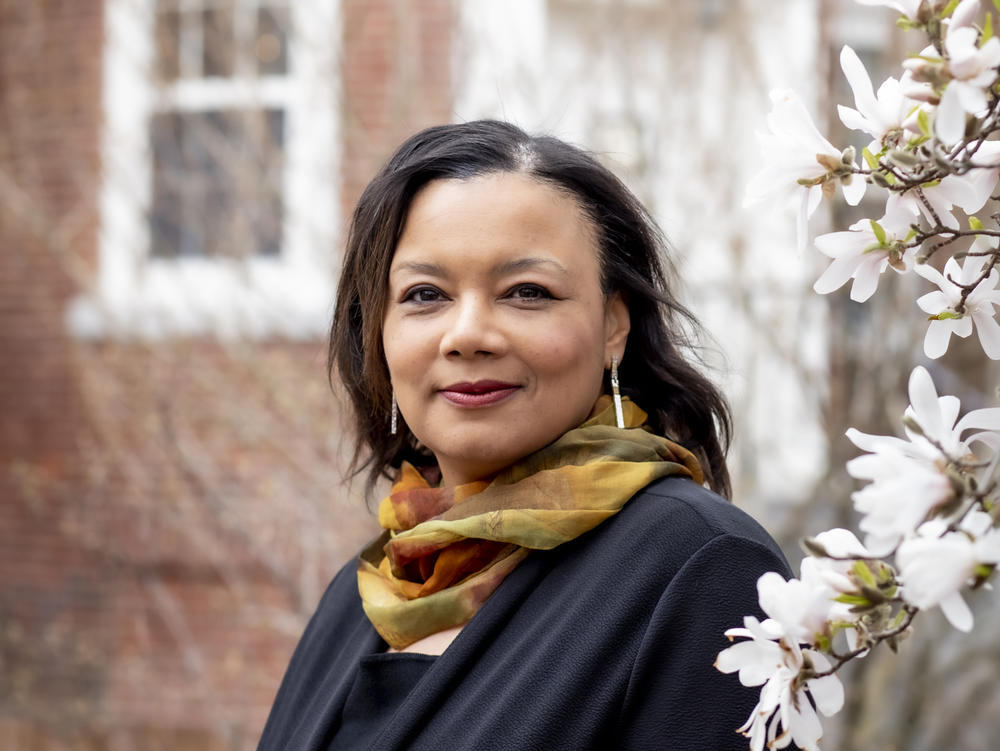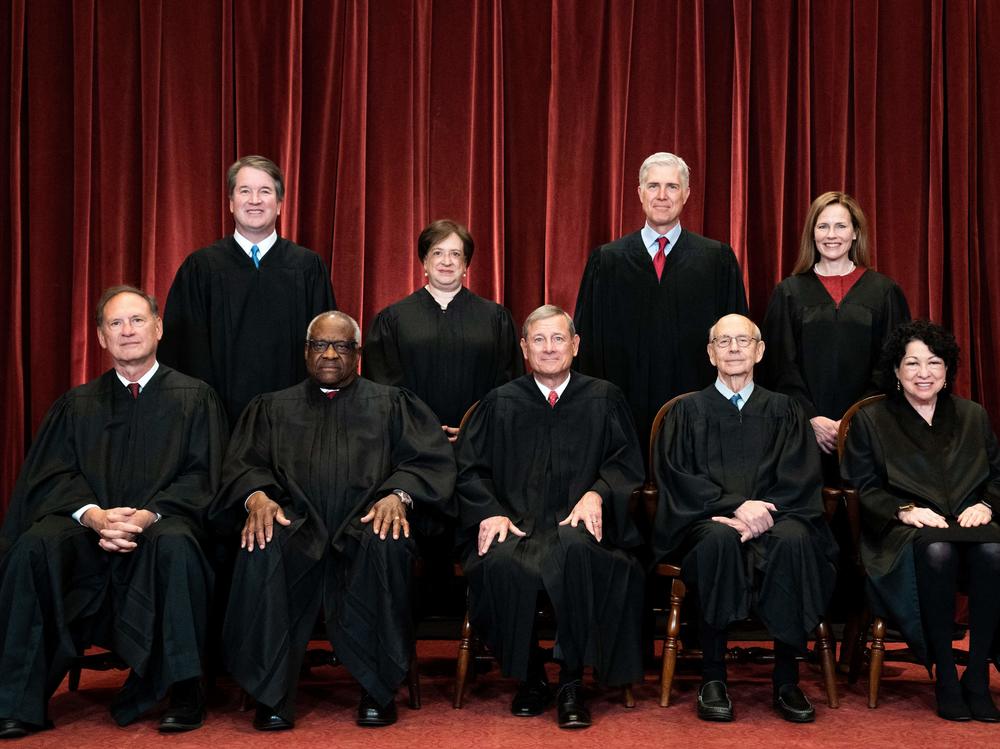Section Branding
Header Content
A Black woman on the High Court is a good start. But representation has limits.
Primary Content
The history of Black women and the law is, until relatively recently, "a history of impressive firsts," according to Tomiko Brown-Nagin, the dean of Harvard Radcliffe Institute for Advanced Study and a professor of law and history at Harvard.
There's Charlotte Ray, the first Black woman lawyer and a graduate of Howard law school. There's Jane Bolin, the first Black woman judge in the United States. There's Pauli Murray, who coined the term Jane Crow, and whose legal arguments laid the groundwork for desegregating public schools and extending the rights of women and LGQTB people. Murray was the first Black person to earn a JSD from Yale Law, and the first Black person perceived as a woman to be ordained an Episcopal priest.
Then there's Constance Baker Motley, the first Black woman to serve as a federal judge, and the subject of Brown-Nagin's most recent book, Civil Rights Queen.
"She was the first Black woman to argue at the Supreme Court," Brown-Nagin says. She went on to argue 10 cases before the nation's highest court, winning nine of them. Motley was also on the shortlist to be nominated to sit on that court. "We could have had this 50 years ago," says Nagin-Brown. "This is a long overdue moment."
The this Brown-Nagin is talking about is another first, the first Black woman justice on the Supreme Court.
President Biden made the pledge to appoint a Black woman justice, a pledge that helped pave his road to the White House, and one he promised to deliver on again when Justice Stephen Breyer announced he will retire at the end of this term. Brown-Nagin says while she's glad the moment is finally here, she looks forward to moving beyond firsts.
The Supreme Court has existed for 233 years and only five justices have been women
"If we can get to a point where it's not so significant that a Black woman is appointed to some prestigious position, then we will have come closer to the dream of equality that so many civil rights activists and lawyers fought for, for so many years."
LaDoris Cordell is part of that history of firsts. In 1982, she was the first Black woman appointed as a judge in Northern California. She's now retired, but last year Her Honor, a memoir about her life on the bench, was published. Cordell says back then she got the same questions that some Republicans are raising now.
"I was asked, pointedly, when I was appointed, well, maybe you just got appointed because you're Black," Cordell says. "And my response is I would rather be appointed because I'm Black than not be appointed because I'm Black."
The Supreme Court has existed for 233 years, with 115 sitting justices. Only five of those have been women, and only three people of color. "We had 110 white men who were appointed to the U.S. Supreme court," Cordell says. "And nobody seemed to be bothered by that at all."
Cordell says she believes deeply in the founding principles of America. She rattles off a list — due process, the right to a speedy trial, the right against self incrimination and, in the Declaration of Independence, the statement that all men are created equal — with the right to life, liberty and the pursuit of happiness.
But Cordell points out that those principles were written by white, land-owning men.
"Many of whom owned people who look like me," Cordell says. "They did not intend those principles to apply to women, to apply to poor people or to apply to people of color."
But those founding principles are supposed to apply to everyone now, and Cordell says there's a disconnect when the people who have power over ensuring that don't look like everyone.
"America has all of these different races and ethnicities and genders, and that's what makes America so wonderful," Cordell says. "But not so much with the U.S. Supreme Court, which lays down the law of the land."
"It's so important that people of different backgrounds are part of that body, that confers and exchanges ideas and thoughts," Cordell says.
A representational democracy should reflect its people
This is a central argument for why representation is so important — that a representational democracy should reflect its people. Another argument is that it opens up what future generations believe is possible.
Cordell has had that kind of impact.
Before she met Cordell, Margaret Russell hadn't really thought about going into the law. "LaDoris Cordell is the first Black judge I ever met," she says. Now Russell teaches law at Santa Clara University.
Russell is Black and Japanese American and she says there's great power in being able to see someone who looks like you in positions of power.
"After an entire life of never seeing anyone who looks like you, it transforms your idea of the possibilities of what that institution could be, in what you as a person can be," she says.
But Russell is under no illusion that a single Black woman can transform this court, with its conservative supermajority set to overturn civil rights cases in this session and beyond. "In terms of actually affecting decisions in these momentous cases coming up," Russell says, "I think it's not going to happen. "
In many ways the power and potency of this justice will be representational, Russell says. "They will bring up issues and generate discussions and probably generate a lot of emulation and admiration from young women of color," Russell says. "And that's going to have a far more significant effect, I think, than individual decisions."
Her mentor LaDoris Cordell believes there's a little more to it than that. Judges in the minority are called to write dissenting opinions, which do more than just leave a historical record. "Many dissents, if we look through history, have eventually become the majority opinion," Cordell says.
"There are many instances in which that has happened," says Tomiko Brown-Nagin. "One could cite the differences between Plessy v. Ferguson and Brown v. Board of Education." One ruling upheld segregation, while the other, more than half a century later, overruled that decision, finding separate to be inherently unequal.
Brown-Nagin understands the symbolic meaning of this appointment, but she says for her, it's about more than just representation. "It also is a story about substance, about accomplishment and perseverance and resilience, in the context of the legal profession." There are still major barriers to entry, she says, especially for women of color. A biographical database from the Federal Judicial Center shows that out of 3,843 federal judges, less than 2% have been Black women.
Brown-Nagin also cautions against summing up whoever is nominated by their race and gender. "Identity as a defining understanding of one's accomplishments or even one's experiences can flatten our analysis," she says.
To see these women as just a first, as just Black women, diminishes the remarkable individual accomplishments of those being considered.
Brown-Nagin says focusing solely on identity also creates a false impression that someone will rule a certain way because of their race. "There is a lot of literature that calls into question the assumption that identity has a significant impact on judging," she says.
"Black district court judges, for instance, do not actually decide cases in ways that would suggest that race is a driver or a motivating factor in outcomes."
"Diversity alone can not change a system, or ensure the court rules one way or another"
Which should be no surprise to anyone who has watched the Supreme Court's two Black judges. Thurgood Marshall and Clarence Thomas share an identity, but little else.
Diversity alone can not change a system, or ensure the court rules one way or another. Biden is fulfilling his campaign promise to put a Black woman on the court, in part with the hope that it will energize the Black and democratic vote in the midterms.
But restrictive voting bills and gerrymandered maps are issues the Supreme Court has power over. The court just reinstated a Republican map in Alabama that a lower court found violated the Voting Rights Act by limiting the power of Black voters. Rulings like that have many progressives asking the purpose of getting out the Black vote, if the court just signs off on Republican attempts to dilute that vote. They are calling on Biden to expand the court, and shift the system itself. Biden has so far seemed unwilling and uninterested in doing so.
Is this appointment enough? Margaret Russell recalled the late Supreme Court Justice Ruth Bader Ginsburg's answer to the question of how many women justices would be enough. "She said, nine," Russell says, laughing.
"I mean, it's never enough in the sense that we're never going to really catch up and remedy centuries of racism and sexism. I'm really afraid that we're going to lose ground and go backwards," Russell says.
That doesn't mean Russell doesn't think this appointment will be a significant step forward. Representation is important, she says. It just has limits.
Copyright 2022 NPR. To see more, visit https://www.npr.org.
Bottom Content


